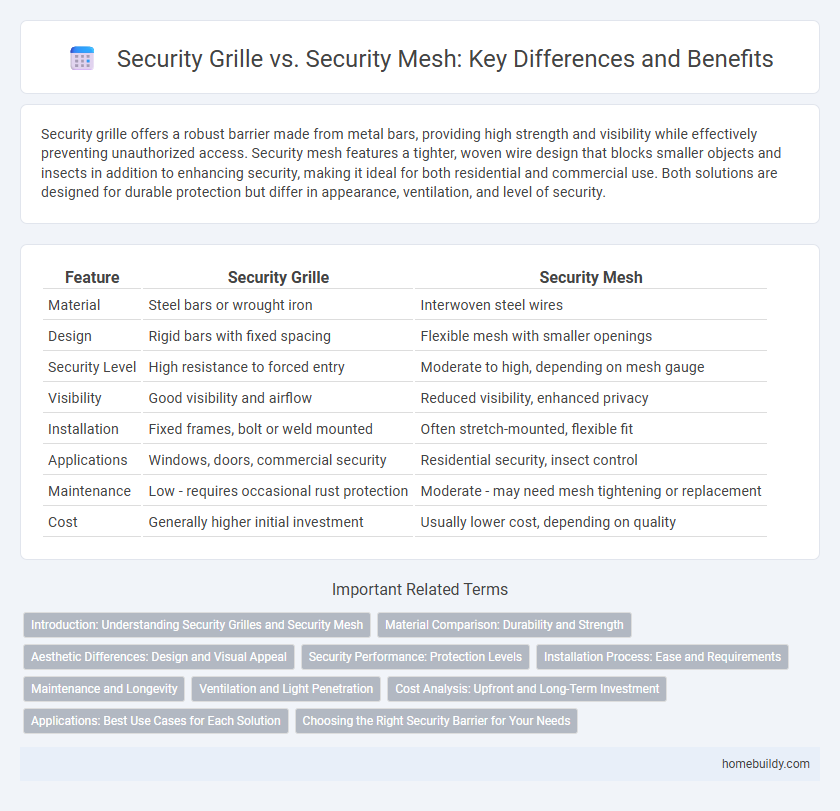Security grille offers a robust barrier made from metal bars, providing high strength and visibility while effectively preventing unauthorized access. Security mesh features a tighter, woven wire design that blocks smaller objects and insects in addition to enhancing security, making it ideal for both residential and commercial use. Both solutions are designed for durable protection but differ in appearance, ventilation, and level of security.
Table of Comparison
| Feature | Security Grille | Security Mesh |
|---|---|---|
| Material | Steel bars or wrought iron | Interwoven steel wires |
| Design | Rigid bars with fixed spacing | Flexible mesh with smaller openings |
| Security Level | High resistance to forced entry | Moderate to high, depending on mesh gauge |
| Visibility | Good visibility and airflow | Reduced visibility, enhanced privacy |
| Installation | Fixed frames, bolt or weld mounted | Often stretch-mounted, flexible fit |
| Applications | Windows, doors, commercial security | Residential security, insect control |
| Maintenance | Low - requires occasional rust protection | Moderate - may need mesh tightening or replacement |
| Cost | Generally higher initial investment | Usually lower cost, depending on quality |
Introduction: Understanding Security Grilles and Security Mesh
Security grilles consist of rigid metal bars or profiles designed to provide high security by preventing unauthorized access while allowing visibility and airflow. Security mesh features a woven or welded wire pattern offering a flexible barrier that balances protection with lighter weight and ease of installation. Both solutions enhance property safety, but security grilles typically offer greater resistance to forced entry compared to security mesh.
Material Comparison: Durability and Strength
Security grilles are typically made from robust materials like stainless steel or aluminum, offering higher durability and strength compared to security mesh, which often uses woven or welded wire with thinner gauges. The solid bars in security grilles provide superior resistance to impact and forced entry, making them ideal for high-security applications. In contrast, security mesh prioritizes coverage and visibility but may sacrifice some strength due to its finer construction.
Aesthetic Differences: Design and Visual Appeal
Security grilles offer a more structured and robust design with thicker bars, providing a classic and industrial aesthetic that enhances building facades. Security mesh features a finer, woven pattern that creates a subtle and modern appearance, allowing for greater visibility and less visual obstruction. The choice between them depends on balancing security needs with the desired visual integration and architectural style.
Security Performance: Protection Levels
Security grilles provide robust protection through rigid metal bars arranged in a fixed pattern, effectively deterring forced entry and physical attacks. Security mesh offers enhanced security performance with tightly woven steel wires, delivering high resistance against cutting and puncturing while maintaining visibility and airflow. Both options ensure varying levels of protection, with security mesh often outperforming grilles in preventing intrusions due to its dense structure and flexibility.
Installation Process: Ease and Requirements
Security grilles typically feature a straightforward installation process involving mounting on window or door frames with basic tools, making them easier and faster to install compared to security mesh. Security mesh requires precise fitting and often more specialized tools or professional assistance due to its fine woven design and tensioning requirements. The ease of installation for security grilles makes them a preferred choice for quick upgrades in home or commercial security systems.
Maintenance and Longevity
Security grilles require minimal maintenance due to their sturdy metal construction, which resists rust and corrosion, ensuring long-term durability. Their design allows for easy cleaning and occasional lubrication of moving parts to maintain smooth operation. Security mesh, while providing similar protection, often demands more frequent inspection and repair to address potential tears or wear, which can impact its longevity.
Ventilation and Light Penetration
Security grilles offer superior ventilation and light penetration compared to security mesh due to their open bar design that allows more air flow and natural light into spaces. The wider gaps in security grilles facilitate better air circulation, reducing the buildup of heat and improving indoor air quality while maintaining high security standards. In contrast, security meshes have tighter, interwoven patterns that restrict airflow and limit light passage, making them less effective in areas where ventilation and illumination are priorities.
Cost Analysis: Upfront and Long-Term Investment
Security grilles generally present a lower upfront cost compared to security mesh due to simpler materials and installation processes. Long-term investment favors security mesh, as its durability and resistance to tampering reduce maintenance and replacement expenses over time. Choosing between security grille and mesh depends on balancing initial budget constraints against anticipated lifecycle costs and security requirements.
Applications: Best Use Cases for Each Solution
Security grilles excel in securing storefronts, windows, and entrances where strong physical barriers and visibility are essential, making them ideal for retail shops and commercial buildings. Security mesh is better suited for ventilation openings, fencing, and areas requiring insect control alongside security, such as residential properties and industrial facilities. Each solution optimizes safety and functionality based on specific environmental and security needs.
Choosing the Right Security Barrier for Your Needs
Security grilles offer robust physical barriers with a solid metal framework ideal for high-security needs and visibility, while security mesh provides a finer, flexible barrier that excels in preventing smaller intrusions without obstructing airflow. Selecting between security grille and security mesh depends on factors such as security level requirements, ventilation needs, and aesthetic preferences. Consider durability, installation environment, and maintenance demands to ensure the chosen security barrier effectively balances protection and practicality.
Security grille vs Security mesh Infographic

 homebuildy.com
homebuildy.com